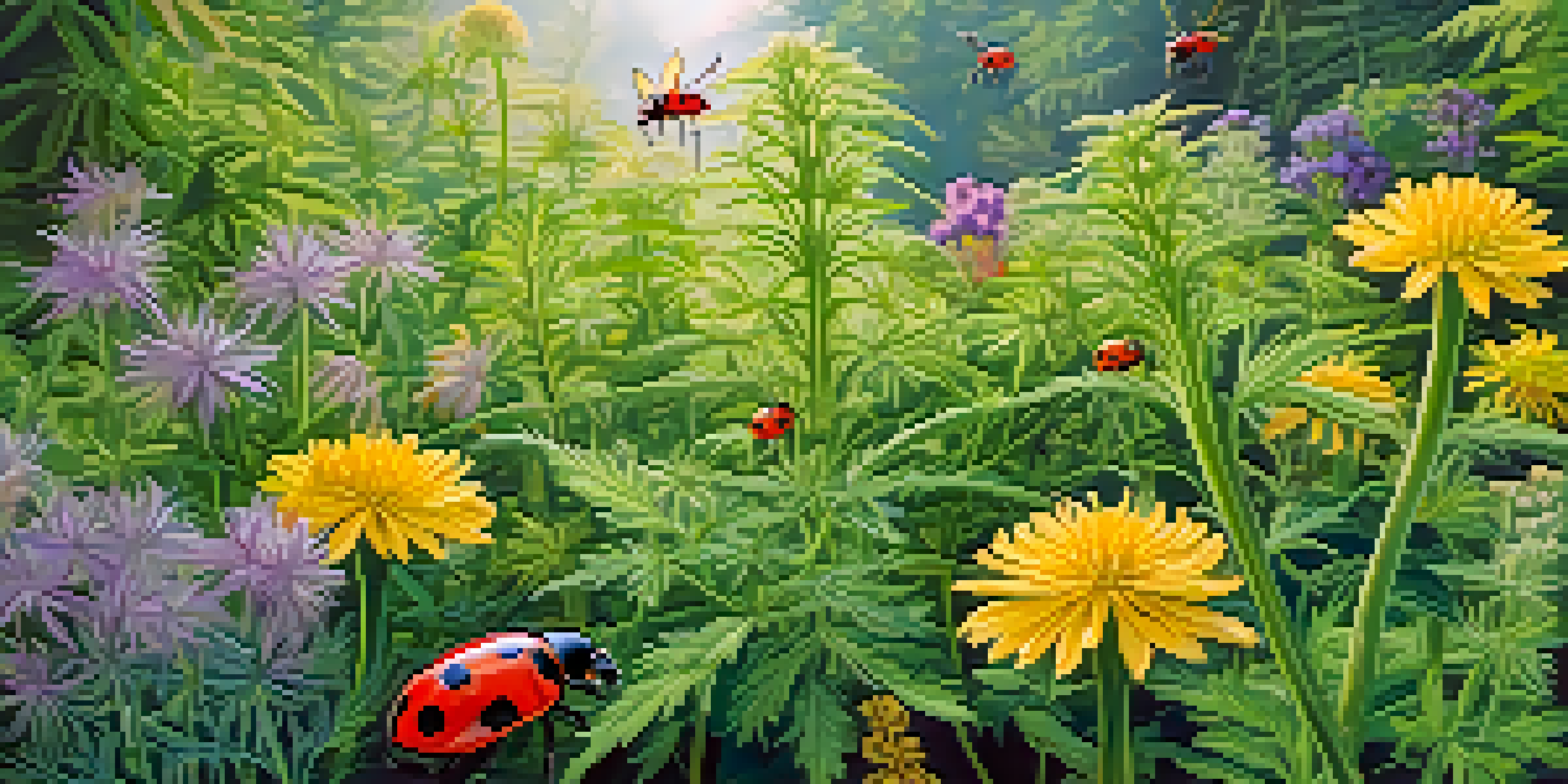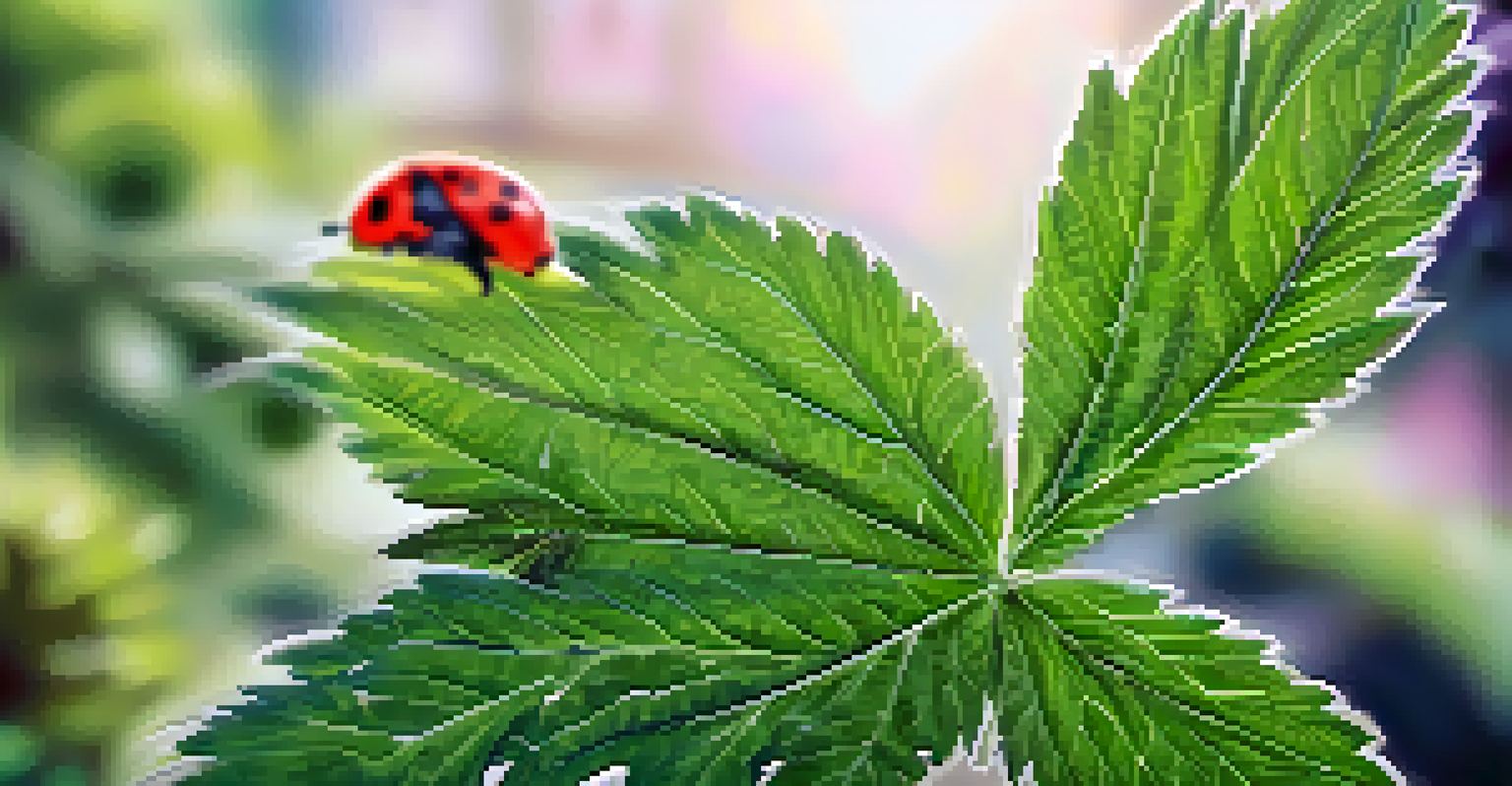Organic Pest Management Techniques for Cannabis Gardens

Understanding the Importance of Organic Pest Management
Organic pest management is crucial for cannabis gardens, as it ensures the health of both plants and consumers. Unlike synthetic pesticides, organic methods prioritize natural solutions that are safer for the environment. This holistic approach not only protects your plants but also enhances the quality of the final product, making it more appealing to health-conscious consumers.
Nature does not hurry, yet everything is accomplished.
By implementing organic strategies, growers can minimize chemical residue and promote biodiversity in their gardens. For instance, attracting beneficial insects like ladybugs can help control aphid populations without resorting to harmful sprays. This not only supports a healthier ecosystem but also results in a more sustainable growing environment.
Ultimately, understanding and practicing organic pest management can lead to a healthier cannabis crop and a more responsible cultivation practice. This approach aligns with the growing demand for organic products, ensuring your garden meets market expectations while fostering environmental stewardship.
Identifying Common Pests in Cannabis Gardens
To effectively manage pests, it's essential first to identify them. Common culprits in cannabis gardens include aphids, spider mites, and whiteflies, which can wreak havoc on your plants if left unchecked. Each pest has its own set of characteristics; for example, spider mites are tiny and often leave fine webbing on leaves, while aphids are small and can be found in clusters on new growth.

Regular monitoring is key to early detection. Set aside time each week to inspect your plants, looking for signs of pest activity such as discolored leaves or visible insects. By catching these issues early, you can implement organic strategies before infestations become severe.
Embrace Organic Pest Management
Organic pest management enhances plant health and appeals to health-conscious consumers by using natural solutions.
Moreover, understanding the life cycles of these pests can aid in your management efforts. For instance, knowing when adult insects lay eggs can help you time your interventions more effectively, allowing you to target them at their most vulnerable stages.
Utilizing Cultural Practices for Pest Control
Cultural practices are fundamental in organic pest management, as they involve altering your garden environment to make it less hospitable for pests. Techniques such as crop rotation and companion planting can disrupt pest life cycles and reduce their populations. For example, planting marigolds alongside cannabis can deter certain pests due to their natural repellent properties.
The greatest threat to our planet is the belief that someone else will save it.
Maintaining healthy soil is another cultural practice that fosters strong plants capable of resisting pests. Healthy plants are less susceptible to infestations, so focus on adding organic matter, like compost, to improve soil quality. This not only nourishes your cannabis plants but also enhances their overall resilience.
Additionally, proper spacing and pruning promote air circulation and light penetration, making it harder for pests to thrive. By creating an optimal growing environment, you can reduce pest pressure and create a flourishing cannabis garden.
Natural Predators: Allies in Pest Control
In the world of organic pest management, natural predators are your best friends. Ladybugs, predatory mites, and lacewings can significantly reduce pest populations without the need for chemical interventions. By encouraging these beneficial insects in your garden, you can establish a natural balance that minimizes the need for pest control measures.
To attract these allies, consider planting diverse flowering plants that provide nectar and habitat. For example, flowering herbs like dill and fennel are excellent choices to lure in ladybugs. The more diverse your garden, the more likely you are to invite these helpful insects.
Identify Pests for Effective Control
Recognizing common pests like aphids and spider mites is essential for timely and effective organic management.
However, it's essential to ensure that your garden is conducive to their survival. Avoid using broad-spectrum insecticides, as these can harm beneficial insects along with the pests. Embracing a balanced ecosystem will lead to healthier plants and a more sustainable gardening practice.
DIY Organic Pest Control Solutions
Creating your own organic pest control solutions can be both cost-effective and efficient. Common ingredients like neem oil, garlic, and diatomaceous earth can work wonders in deterring pests. For instance, a simple garlic spray can repel aphids and other soft-bodied insects, while neem oil targets pests at various life stages.
To make a garlic spray, blend a few cloves with water, strain the mixture, and spray it directly onto the affected plants. Similarly, diatomaceous earth, a natural abrasive, can be sprinkled around your plants to deter crawling insects. Just be sure to reapply after watering or rain.
These DIY solutions not only reduce your reliance on commercial pesticides but also empower you as a gardener. The more you experiment with these natural methods, the better you’ll understand what works best for your cannabis garden.
The Role of Essential Oils in Pest Management
Essential oils have gained popularity as effective organic pest management tools. Oils like peppermint, tea tree, and lavender possess insect-repelling properties that can deter a wide range of pests. For example, peppermint oil is particularly effective against spiders and ants, making it a versatile addition to your pest control toolkit.
To use essential oils, simply dilute them with water and a few drops of soap, then spray the mixture onto affected plants. This not only helps control pests but also leaves a pleasant scent in your garden. Plus, essential oils are often less harmful to beneficial insects compared to traditional pesticides.
Utilize Natural Predators Wisely
Encouraging natural predators like ladybugs can help maintain pest populations without relying on chemicals.
However, always test a small area of your plants before widespread application, as some plants may be sensitive to certain oils. With a little trial and error, you can find the best essential oils that suit your cannabis garden's specific needs.
Monitoring and Adjusting Your Pest Management Strategy
Monitoring your pest management efforts is crucial for ongoing success. Keep a journal to track pest populations and the effectiveness of the strategies you've implemented. This will help you identify patterns and make informed adjustments to your approach over time.
Regularly evaluate the health of your plants and the presence of beneficial insects. If you notice that certain methods aren't yielding results, don’t hesitate to pivot and try new techniques. The world of organic gardening is all about experimentation and adaptation.

By staying vigilant and flexible, you can refine your pest management strategy to better suit your garden's needs. Remember, the ultimate goal is to create a thriving ecosystem that supports healthy cannabis plants while minimizing pest issues.